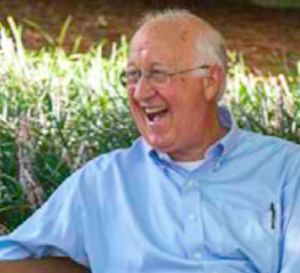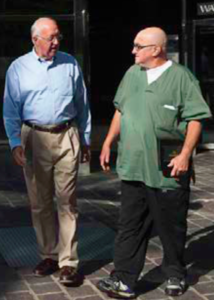“I see a lot of what we call ‘social isolation.'”
When he retired after working for 30 years in the corporate oil world in Texas, Tommy Cole returned to his native North Carolina and immediately began helping folks.
He became the executive director of Sunnyside Ministry in Winston-Salem, an agency of the Moravian church that offers emergency assistance—food, financial, clothing—to people in need.
“In a typical year, Sunnyside would provide $1.5 million to $2 million in assistance,’’ Cole says.
“We averaged 200 volunteers; people who go to Sunnyside as a way of living out their faith.”
After eight years with Sunnyside, Cole retired for a second time. It didn’t take long, however, before he got the call to help again. FaithHealth Connector Bob Hunter was leaving the area and seeking a replacement. He reached out to Cole, a fellow member of Home Moravian Church.
The position appealed to Cole.
“I think it’s a brilliant idea to get the community involved in the health of the community,’’ he says.
Assistance runs the gamut from working with people with complicated legal problems (pointing them to agencies that can help) to transportation needs to visiting people who are shut-ins.
Cole says daytime transportation is the top need he has encountered during his year as a Connector.
 One person he takes to medical appointments and the pharmacy is John Pegram, 64, of Winston-Salem (above right, Cole is on left). Pegram can no longer drive and has many health issues — including high blood pressure, high cholesterol and circulation problems that make walking difficult.
One person he takes to medical appointments and the pharmacy is John Pegram, 64, of Winston-Salem (above right, Cole is on left). Pegram can no longer drive and has many health issues — including high blood pressure, high cholesterol and circulation problems that make walking difficult.
A jovial man who acknowledges he doesn’t exercise enough, he’s come to depend on Cole to help him get to his medical appointments. When asked how much it helps to have a FaithHealth Connector, Pegram gets serious.
“A lot,’’ he says, “’cause I wouldn’t be getting around without it.’’
You have to work to create that relationship
Oftentimes, especially when a situation is complicated, Cole will investigate it himself first and handle direct contact, helping someone get the connection they may need, for example, for financial assistance.
Other times, being a Connector means Cole arranges with church volunteers to provide rides to someone who has no means to get to a doctor’s appointment. Referrals come from the FaithHealth program, from churches and sometimes by word of mouth.
“A lot of times people are a little embarrassed to ask for help,” Cole says. “Sometimes when I make my contact, it’s not clear they want to admit their problem to me. You have to work to create that relationship.”
“Once I go to see people and meet face to face with them, they own up to the fact that they really need help.”
— Les Gura

